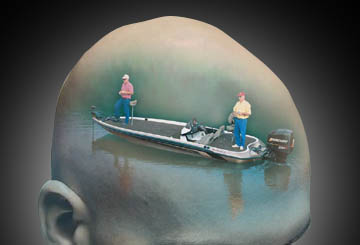Be yourself, be your best
Balancing self-acceptance with self-development

As I talk to different levels of tournament fishermen around the country, I frequently hear anglers negatively comparing themselves to top competitors. Co-anglers as well as second- and third-tier pros are inclined to make comments like, “I sure wish I could fish crankbaits like David Fritts” or “I’d like to be as confident as Larry Nixon, `cause when he gets a couple of bites in practice, he thinks they were 6-ounders, while I figure my bites were probably bream or drum.”
These kinds of comments underscore a universal tension in competitors across many sports – the pull between being comfortable with yourself on the one hand and wanting to improve on the other. This month let’s take a look at how these apparently competing pressures can work together.
Push-pull
In a number of life domains, and certainly in the world of fishing, we must balance opposing forces in order to be maximally successful. Just recently, round two of the Stren Series tournament on Lake Champlain was canceled due to high winds. The thrill of catching champion-sized smallmouths and the importance of promoting our sport were weighed against the risks associated with competing in potentially unsafe conditions. As you know, Mother Nature won this one.
Similarly, in the psychological battle we wage with ourselves to be top performers, we need to take seriously both sides of the dilemma that is self-acceptance vs. self-improvement.
Be yourself
Hear this: Self-acceptance comes first. We have talked in other articles about how it is important to understand your temperament, your values and your competitive angling strengths and skills. However, let me suggest that if you haven’t done so recently, you would be wise to do a full psychological inventory. Here’s what I mean.
Dig out your Performance Psychology and Tournament Fishing notebook, the one you have been using since you first started reading these articles (if you don’t have one, go to your local discount store and buy a three-subject notebook and label it Performance Psychology and Tournament Fishing). Fill the first page with words, phrases and sentences that describe you. You can use adjectives like competitive, intense, laid-back, intuitive, analytical and the like, or phrases like attentive father, dependable church member, reliable friend, and so forth. Also list your competitive-fishing skills.
Enlist the help of a friend or two, or perhaps a relative or significant other to make your inventory complete. On the first page, focus primarily on the positive facets of your knowledge, skills and characteristics.
Now, turn the page and write down those traits or dimensions where you are not particularly strong, or where you would like to improve. If you recognize the risks associated with being too competitive, for example, put that down. Perhaps you are not as attentive to your loved ones as you would like to be, so candidly write this in your book. If you have a specific fishing skill you would like to improve, admit it by putting ink on paper. You don’t have to show this to anyone, so as we have encouraged you before, be honest with yourself.
Now set your notebook aside. After a few days, go back and review what you have written about yourself. See if you have painted an accurate picture. Feel free to revise your initial self-evaluation. Once you are satisfied that you have a reasonably full and accurate portrait, you should congratulate yourself on being candidly aware of exactly who and what you are.
Now comes the important part. Looking objectively at both pages, your strengths and your weaknesses, give yourself a pat on the back for being you. While there are a finite number of human talents and characteristics, there are infinite combinations, and clearly there is only one you. All of the worthwhile self-concept/self-confidence theories begin with a foundation of self-acceptance. You have to be able to look yourself in the mirror (or in this case in the notebook) and say something like, “Yep, this is me. I like who I am.” After all, this is what your best friends and closest relatives would say about you, and it is what you would say about them. None of us is perfect, and still we must fundamentally accept and value ourselves and the people around us, in spite of our flaws.
Self-improvement
Nevertheless, while self-acceptance is necessary as a foundation, it is not enough if we wish to become champion competitive anglers. Previous articles in this series on goal-setting, practice schedules, skill improvement and challenging yourself to realize your potential are all worth rereading at this point. Even the best anglers, including the guys we admire like Larry Nixon and David Fritts, never stop learning.
However, at least once a month go back and review your inventory, and refamiliarize yourself with the guy who wears your shirt and drives your boat. He is your best ally, and he needs to be your friend.  Emphasize self-acceptance, never give up on self-development, and do your best to keep the two in balance. From a performance-psychology perspective, master this and you will be way ahead of the crowd.
Emphasize self-acceptance, never give up on self-development, and do your best to keep the two in balance. From a performance-psychology perspective, master this and you will be way ahead of the crowd.
Jay T. McNamara, Ph.D., L.P., is a psychologist, who is also an avid bass and walleye angler. With more than 26 years of professional experience complemented by participation in competitive fishing at local and national levels, he is uniquely qualified to illustrate how performance psychology principles apply to tournament fishing.